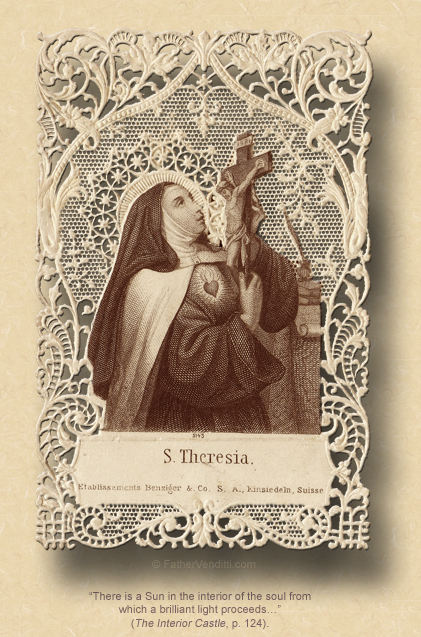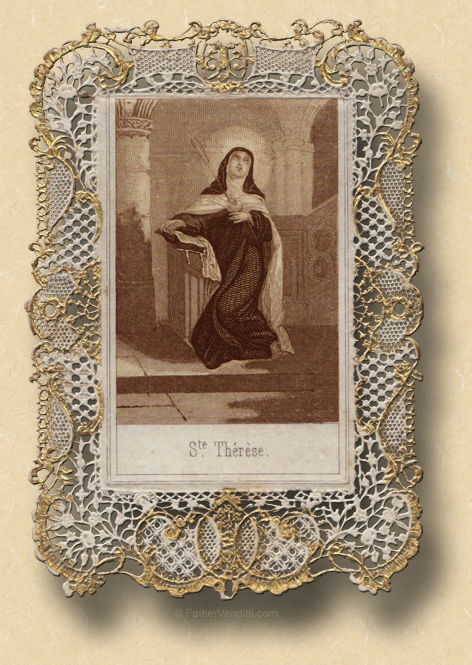The Lost Art of the Discernment of Spirits.
The Memorial of Saint Teresa of Jesus, Virgin & Doctor of the Church.
Lessons from the primary feria, according to the ordinary form of the Roman Rite:
• Romans 1: 16-25.
• Psalm 19: 2-5.
• Luke 11: 37-41.
|
…or, from the proper:
• Romans 8: 22-27.
• Psalm 19: 8-11.
• John 15: 1-8.
…or, any lessons from the common of Virgins, or the common of Holy Men & Women for Religious.
|
The Third Class Feast of Saint Teresa, Virgin & Doctor of the Church.
Lessons from the common "Dilexísti…" of a Virgin not a Martyr, according to the extraordinary form of the Roman Rite:
• II Corinthians 10: 17-18; 11: 1-2.
• Psalm 44: 5, 15-16.
• Matthew 25: 1-13.
FatherVenditti.com
|
 6:42 AM 10/15/2019 — The Memorial of Saint Teresa of Avila—or Saint Teresa of Jesus, as she's officially known—presents us with another example—as we've seen many times now—of someone among the saints of the Church who was convinced that God wanted her to do something which turned out not to be what God wanted. As a young girl, Teresa was convinced with all her heart that God was calling her to a take the Gospel to Africa where she was certain she would win the crown of martyrdom, and she ran away from home with that idea in mind; but, they caught her and brought her home. After her mother died she dedicated herself to the Mother of God, and professed her vows as a Carmelite and, as you know, together with the future Saint John of the Cross, instituted a general reform of the Carmelite order, giving rise to the Carmelites of the Strict Observance, known today as the “Descaled Carmelites” or the Carmelites “without shoes.” This was the order that Thérèse of the Child Jesus would eventually join. She died on this day in 1582 at the age of sixty-seven. We remember her primarily for her ascetical works, which resulted in her being proclaimed a Doctor of the Church in 1970. 6:42 AM 10/15/2019 — The Memorial of Saint Teresa of Avila—or Saint Teresa of Jesus, as she's officially known—presents us with another example—as we've seen many times now—of someone among the saints of the Church who was convinced that God wanted her to do something which turned out not to be what God wanted. As a young girl, Teresa was convinced with all her heart that God was calling her to a take the Gospel to Africa where she was certain she would win the crown of martyrdom, and she ran away from home with that idea in mind; but, they caught her and brought her home. After her mother died she dedicated herself to the Mother of God, and professed her vows as a Carmelite and, as you know, together with the future Saint John of the Cross, instituted a general reform of the Carmelite order, giving rise to the Carmelites of the Strict Observance, known today as the “Descaled Carmelites” or the Carmelites “without shoes.” This was the order that Thérèse of the Child Jesus would eventually join. She died on this day in 1582 at the age of sixty-seven. We remember her primarily for her ascetical works, which resulted in her being proclaimed a Doctor of the Church in 1970.
Her approach to spirituality was both eclectic and mystical, and for that reason deviated substantially from the method of Saint Ignatius and the Jesuits which pretty much ruled ascetical theology up to that point. Even in my own day in the seminary, the works of the Spanish Mystics, which was how Saint Teresa and Saint John of the Cross were known, were considered suspect. And even after her holiness had been recognized and her approach received the complete endorsement of the Church, there were still many people in the Church who regarded her departure from the Spiritual Exercises of Saint Ignatius in favor of a more mystical and contemplative approach as dangerous for the average lay person. For some, in wouldn't be until Saint John Paul II became Pope that a lot of old timers would eventually “come around” and stop agitating about it, as his personal spirituality was very much guided by both Saint Teresa and Saint John of the Cross.
But the point for our reflection today is the lesson of her early life, and we have seen it in the lives of so many other saints: that just because something is a good and holy thing to do doesn't mean that it's what God wants for us. You might remember from our treatment of the life of Saint Camillus de Lellis, who was so thoroughly convinced that God was calling him to do one thing and ended up doing something else for God only after having suffered multiple disappointments, how important it is to practice that rare art of the discernment of spirits, in which what we want to do collides with what God wants us to do. We fall in love with a particular vocation or avocation, thoroughly convinced that it's what God wants, when, in reality, it's what we want.
 I remember having this argument with someone who was convinced that God wanted her to get involved in Operation Rescue, and who started getting herself arrested at abortion clinics; the problem was that she had a family who depended on her being around, and she wasn't around whenever she was in jail and spending weeks in litigation. She would say to me, “But Bishop Vaughn is getting arrested all the time,” and I would reply, “Yes, but Bishop Vaughn is retired; he no longer has to care for a parish or a diocese, so he's free to do what he wants. You're not.” She couldn't see the distinction between something that was good and holy in itself and something that was appropriate for her state in life, and that's the result of the sin of pride. She thought she was focused on what God wanted, but it was really what she wanted. I remember having this argument with someone who was convinced that God wanted her to get involved in Operation Rescue, and who started getting herself arrested at abortion clinics; the problem was that she had a family who depended on her being around, and she wasn't around whenever she was in jail and spending weeks in litigation. She would say to me, “But Bishop Vaughn is getting arrested all the time,” and I would reply, “Yes, but Bishop Vaughn is retired; he no longer has to care for a parish or a diocese, so he's free to do what he wants. You're not.” She couldn't see the distinction between something that was good and holy in itself and something that was appropriate for her state in life, and that's the result of the sin of pride. She thought she was focused on what God wanted, but it was really what she wanted.
Had Saint Teresa gotten her way as a child and received the crown of martyrdom in Africa, a whole spiritual movement in the Church wouldn't have been born, Pope Saint John Paul II probably wouldn't have become a priest, the Little Flower would have never become a Descaled Carmelite because the Descaled Carmelites wouldn't have existed. That's the terrible truth about the discernment of spirits: it isn't black and white; it's not just a question of doing what is good vs. doing what is evil. Even among all the good and holy things, we need to attune ourselves and immerse ourselves so much in the will of God so as to make sure that what we do is what God wants for us; and, what God wants for us may be totally different from what he wants for someone else, and may be very different from what we may want for ourselves.
It's always dangerous to try to boil down a spiritual program into slogans, but, if we had to distill Saint Teresa's and the whole phenomenon of the Spanish Mystics into a single sentence it would probably be this: not only is God's will often not our own; it almost never is.

|

